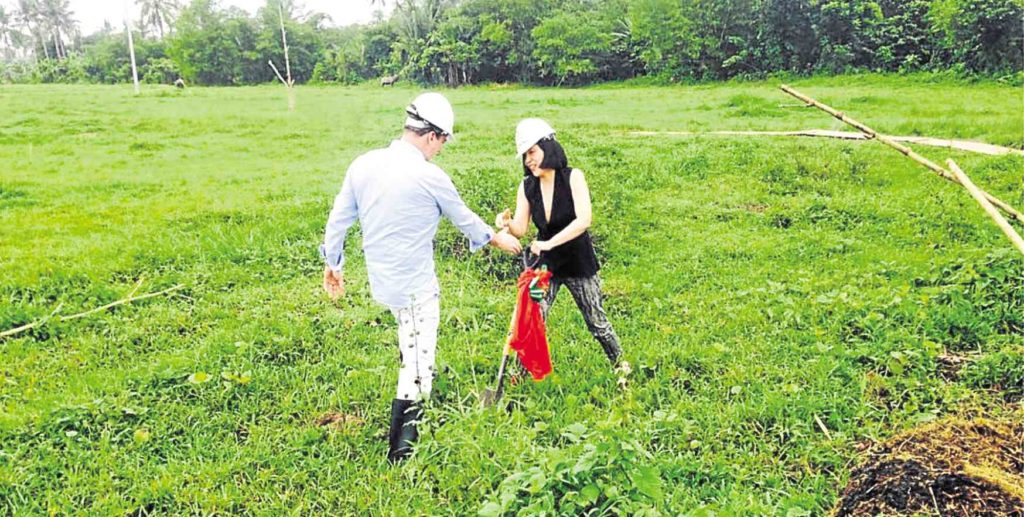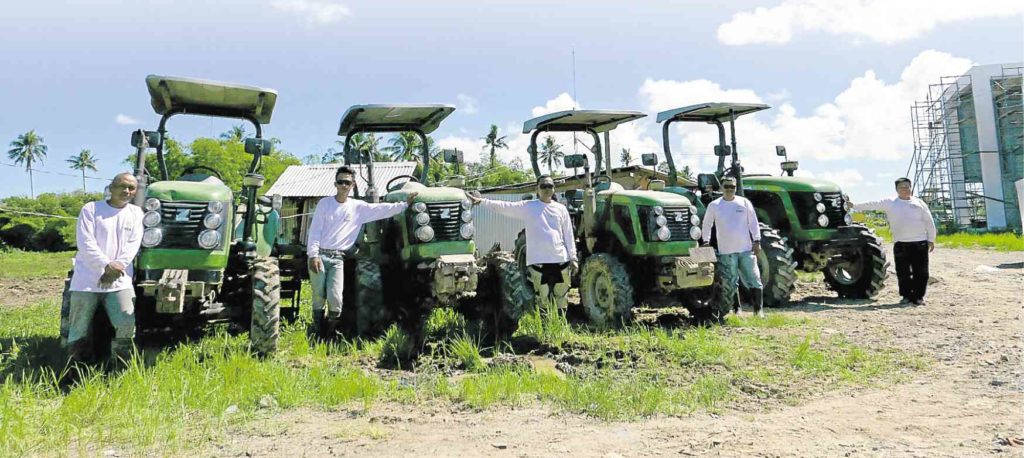‘Rice revolution’ sparked in Leyte

Trailblazing couple Patrick Renucci and Rachel Renucci-Tan want to spark a “rice revolution” in Leyte. (Top) New tractors are available to farmers who want to adopt more modern farming techniques.
It has been four years since Supertyphoon “Yolanda” barreled through central Philippines and left a wide swath of destruction from which many are still struggling to recover.
But in Alangalang, a second class municipality in Leyte about 30 kilometers south of Tacloban City, a “rice revolution” is taking place, one that promises to make the rice farmers here and in surrounding towns earn even more than they did before “Yolanda” brought them to their knees.
Business model
Leading the charge is the husband-and-wife team of French-Italian Patrick Francois Renucci and Filipino-Chinese Rachel Renucci-Tan, the founders of Chen Yi Agventures, whose business model promises to be “the national flagship for innovation in rice production.”
By filling a gap in the market —developing the most technologically advanced post-harvest facilities—Chen Yi promises to be a major producer that integrates seed growing, planting, farm management, harvesting and rice production in the Visayas and Mindanao.
The couple first set foot in the town in 2015, driven by their desire to contribute to the rebuilding of the province hit hard by “Yolanda.”
And already, the literal and figurative seeds that they planted have sprouted, encouraging the couple, who have been married for 10 years, to carry on their life’s work.
To think that practically everyone they knew and loved thought they were crazy for even thinking about going back to the Philippines to start a business, even more so when they said they were going to unknown Alangalang.
Compelling reasons
Their well-meaning loved ones certainly had compelling reasons to believe that they were not thinking straight.
For one, the power couple gave up lucrative careers, a comfortable life and all that came with it, such as an enviable apartment in the City of Lights with its fine dining and haute couture.
In their former life, Renucci was at the helm of one of France’s largest printing companies. Renucci-Tan, on the other hand, was founder and CEO of Tan-EU EU Capital, a real estate investment management company based in Hong Kong and London.
At its peak, Tan-EU Capital was managing over a billion US dollars, including a special situations real estate fund in partnership with a leading real estate developer in China as well as a distressed Chinese real estate fund that Tan-EU restructured to provide an exit for its investors.
Defying convention, they cashed in most of their chips and then reinvested heavily in Leyte.
And as they look at the 20-foot silos rising from the patch of land in the municipality, and the increase in the incomes of the farmers who early on bought into their grand vision of Leyte at least reclaiming its rank as the fifth leading rice producer in the country, they know for sure that they’ve made the right decision.
Tests of courage
Not to say that their faith in their vision had not been tested, at some points so severe that they were left fretting over whether they had made a gigantic—and extravagant—mistake.
Renucci-Tan tells SundayBiz in an interview that for one thing, they were rejected by as many as 21 banks when they presented their idea of investing in a state-of-the-art post-harvest processing facility in Leyte with the farmers with small parcels of land as the production partners.
“Nobody believed in our project,” shares Tan, “We waited for three years for it to get started.”
When they arrived in 2015, bringing with them their expertise in spotting and capitalizing on opportunities, they started by first understanding the state of rice production in the area.
“We made a survey of over 4,000 farmers to see what exactly was the problem, why were they earning so little. We did not know anything because we are not from here. Out of that survey, we came to understand the main problems—lack of capital, lack of labor and the low yield. Nobody is making enough money, which is not the case when you see the farms in Europe,” says Renucci.
Pain points
From that research, they determined the pain points and proceeded to find solutions, in the name of the farmers who were burdened by earning as low as P19,000 a year.
This is due to a combination of factors such as the lack of seeds, high labor cost due to antiquated production methods, lack of post-harvest facilities that led to the decline in the quality of their produce.
Their solution—their recipe for a social revolution— is the Renucci partnership program, under which the farmers can get a sure market for their produce and access to the proper seeds and technology.
“Revolution,” says Renucci-Tan, “is about a structural change, a major disruption. We want to do that in rice.”
The perennial problem hounding rice farmers, Tan says, was that they did not produce enough and they were buried in debt. This because they lacked access or knowledge about proper farming techniques, the value of mechanization, and access to affordable funds that they need to grow rice.
But from the start they saw the potential of Alangalang, indeed the whole of Leyte, as it was the country’s fifth largest and second largest rice producing area in the Visayas before “Yolanda” struck, and this despite the very low level of farm mechanization, meaning that the farmers still relied mainly on human and animal labor to grow their crop.
Renucci says that because of that potential, he believes that through more modern techniques, such as using the right kind of seeds, proper spacing of the plants and maintenance to prevent infestation, farmers stand to easily double their yield while reducing their cost. The result? An exponential increase in their income.
The proof is already there for skeptics to check.
Pilot area
From the pilot area of 50 hectares in Alangalang and neighboring towns such as Sta. Fe, the partner-farmers who dedicated themselves to learning the Renucci way of growing rice have seen an increase in their output, from just 50 to 80 bags of rice per hectare to as much as 200 bags.
There was no magic involved, says Renucci, just the introduction of more modern methods and materials.
“We are just helping farmers see what farming can really be,” says Renucci.
Premium rice
What’s more, the farmers get to produce affordable premium rice—half the cost of imported Japanese rice—that the market will appreciate.
“We want to give Filipinos the top quality rice that they can deserve. And we can produce beautiful rice from Leyte through technology,” says Renucci-Tan.
The “rice revolution” of Chen Yi means fully mechanized planting and harvesting of rice to increase the yield, quality of palay and therefore the income of farmers. Production cost is lowered and therefore the price to consumers of high quality premium rice.
“Chen Yi wants the ordinary Filipino to enjoy locally produced premium rice of the same quality as Thai Jasmine, Basmati, Japanese rice. Rice that Filipinos deserve; rice that can be produced in Leyte and not imported,” Renucci-Tan says in a statement.
The couple wants to enable the farmers of Leyte to be as competitive as their counterparts in Thailand and Vietnam while deploying advanced rice processing technology to produce affordable ultrapremium rice.
“We own the first “Yolanda”-proof and earthquake resistant rice processing center of this size in the Philippines and we are the first to use technology to merge and level disparate land parcels in order to create vast tracts of rice land found in Thailand, the United States and Europe. These large consolidated rice parcels can optimize irrigation, facilitate water management and ultimately reduce the cost of palay production”, Renucci says in a statement.
Partnership program
Then through the Renucci Partnership program, Chen Yi organizes the farmers by providing low interest loans in kind: Organic fertilizers, pesticides, and one kind of high yielding inbred seed. Chen Yi also extends high-tech planting and harvesting equipment to all farmer members of the program, thereby increasing the quantity and the quality of their palay.
“Chen Yi is targeting no less than 3,500 farmers for Phase I alone and aiming to increase their profits by 8-10x while being a highly profitable private enterprise that delivers affordable ultra-premium rice to the consumers,” Renucci-Tan says.
Recently, the company was able to secure the support of the Land Bank of the Philippines.
With it, the couple hopes that the “rice revolution,” where farmers are given the tools and opportunities they need to dramatically improve their yield and income, will be replicated across the country.
“Someday soon, the Philippines will be self-sufficient and could even export rice,” they say.


